
empire and I
january 22 - march 13 1999
and axiom arts centre, cheltenham
october 30 - december 4 1999
curated by Alana Jelinek
for terra incognita
The influence of this historical inheritance is a racialised hierarchy, a way of looking at the world that profoundly shapes our understanding of who and what we are, defines us in ways that we have not chosen, ways that are not representative, flexible or elective.
As a result, the exhibition is fundamentally concerned with representation, how we represent ourselves and are represented, how we see and are seen. It's an opportunity for artists to mount a challenge to old-world arrogance and 'acceptable' prejudice from distinctly individual perspectives and for us all to re-examine our involvement in a colonial inheritance.
Anthony Key
Alana Jelinek
Rea
Tertia Longmire
Shaheen Merali
Lorrice Douglas
Niema Khan
Erika Tan
Colin Darke's installation work derives from a product of the 'troubles' in the north of Ireland, namely the 'comm'. This is the name, abbreviated from the word 'communication', given to letters smuggled, in and out of gaol by and to Republican prisoners. These are written in tiny lettering on cigarette papers, wrapped in cling film and hidden in the body.
Darke has made work in the form of large-scale comms, incorporating Marxist texts, in order to explore the love/hate relationship between republicanism and socialism.
This led to his installations in which the socialist literature is written by hand onto gallery walls.
Here he aims to question the levels of artistic autonomy in the face of restrictions imposed by galleries and the art establishment in general.
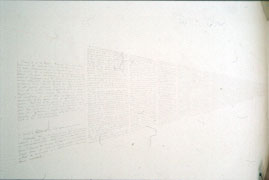
vestible of PMG
'Great Wall' is a sculptural installation, a demarcation of boundary, made of a thousand moulded take-away cartons.
'Free Delivery' re-maps Britain as Britain re-mapped her colonial territories, depicting a nation under negotiation, a site of re-definition and re-vision.
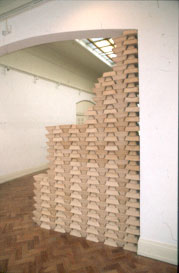
PMG Gallery
'The Spectators', a 12ft x 7ft figurative painting, places a group of white tourists in the Australian desert, the 'terra nullius' or virgin territory that Australia was conceived as before it was yet 'discovered'. What are they doing there and what are they looking at?
The work raises the kind of questions that tourists/colonisers rarely do.
The use of the 'traditional' medium of figurative painting serves as a reminder of the constructed, stylized nature of representations of the world, which are 'framed' and filtered through established patterns of thought.
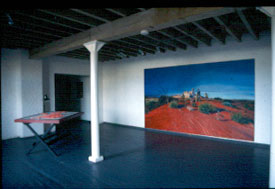
Axiom Gallery
'EYE/I'MMABLAKPIECE' A four-part digital photography piece that traces colonial history inscribed on the black female body.
The dress is typical of those worn by Aboriginal women on outback cattle stations and represents the body as the site of various ideological constructs, from 'Traditional' (wooden beads), 'Christianity' (cross) to 'Civilization' (pearls). 'Blakpiece', the final image, presents a subversion of colonial codes, in which the artist steps into the frame to take control of her own imagery and the camera, the means of representation.
Rea's work appeared courtesy of Boomalli Aboriginal Artists' Co-operative.
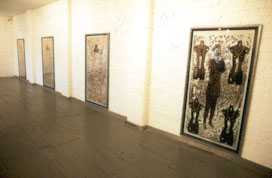
Axiom Gallery
'Unfinished, Nude' refers to the white human body. It is precariously positioned. The surface is raw and untreated. Like a blank canvas it absorbs our perceptions, a screen on which to map revisions of 'post colonial' thought.
'Eyeing up the Nations Wealth (a game for 1 or more players)' (above) uses the mathematical unit of the sphere as a representation for and of the globe.
Positioned to mimic an artefact on display, it is a fly on the wall scenario of the 'colonial fathers' shameless play for expansion, protected from the responsibility of the cultural and philosophical assault that was to condition the legacy of an empire that we inherit today.
The sphere occupies the most central part of the room and echoes the endless dominion of the open blue sky painted across the domed ceiling above it.
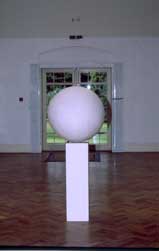
PMG Gallery
"Eyeing up the Nation's Wealth (a game for 1 or more players)"
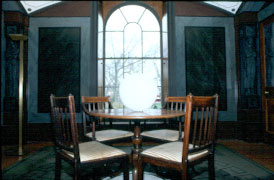
PMG manor, ground floor breakfast room
dig.'Native' is an installation that examines the way we collect and receive images of people originally from outside of Europe in our everyday lives and products.
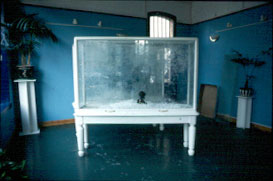
Axiom Gallery
Photographic imagery depicting stories of individuality, spirit and aspirations regardless of social expectations.
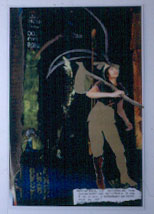
A photographic installation that refers to the town in Pakistan in which the artist spent her early years: Lyallpur, named after a British lieutenant-governor and laid out in the design of the Union Jack. With references to family memory, the work explores ways in which individual identity interacts with history and myth.
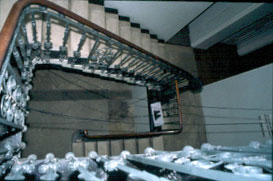
PMG manor, staircase and ground floor
Sited within the museum itself, Erika Tan's work responds to the residues of history, architecture and design characteristic of the Victorian Manor House.
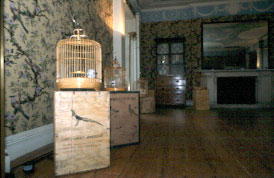
PMG manor, first floor drawing room
The catalogue contains other images of the work on exhibition while some of the artists used the publication to create a related work that was specific to the catalogue.